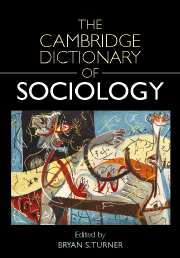P
Published online by Cambridge University Press: 22 October 2021
Summary
panel study
These studies offer researchers the opportunity to follow the same group of research participants over time; they differ from cross-sectional studies (although they may represent sub-components of some cross-sectional studies) in that they allow researchers to track changes in the views, attitudes, and reported behaviors of a defined panel on a longitudinal rather than “snapshot” basis. Panel studies promise to analyze the effect of “real-world” events on particular social groupings. For classic examples of such studies, see the British Household Survey or the University of Michigan – Institute for Social Research's Panel Study of Income Dynamics (PSID), which has followed a representative sample of 8,000 United States households, or 65,000 individuals, since 1968.
Panels may be any social unit with a sufficient degree of theoretical homogeneity to make the study empirically compelling: thus panels may consist in households, university graduates of a given year (otherwise known as age-cohorts), or other groupings with a common and datesensitive life experience such as the birth of a first child. Panels, once constituted, are regularly mined for data, most often using interviews or other standardized surveys, to explore the relationships between lived experience, social factors, and period effects.
Difficulties with panel studies are attrition (if people are followed over months and years some leave the area forgetting to provide a forwarding address, emigrate, or die) a difficulty that may be ameliorated by the adoption of a dynamic sample panel whereby matching “replacement” panel members are substituted for those who drop out. Alternatively, the dynamic methodology may be used to control for “experience bias” – that is to say, respondents becoming practiced at providing material that the researchers wish to hear.
MARK RAPLEY AND SUSAN HANSEN
panopticism
– see Michel Foucault.
paradigm
The concept of paradigm, used by Thomas Samuel Kuhn in his classic book, The Structure of Scientific Revolutions (1962), was taken from its use to describe model “correct” sentences in Latin. Kuhn argued that in science, scientific discourse was rooted in exemplary achievements, such as experiments, which served as models of the correct way to approach scientific problems.
- Type
- Chapter
- Information
- The Cambridge Dictionary of Sociology , pp. 429 - 483Publisher: Cambridge University PressPrint publication year: 2006



